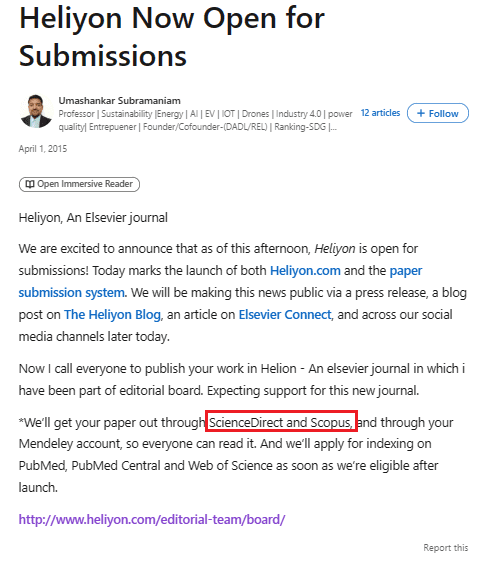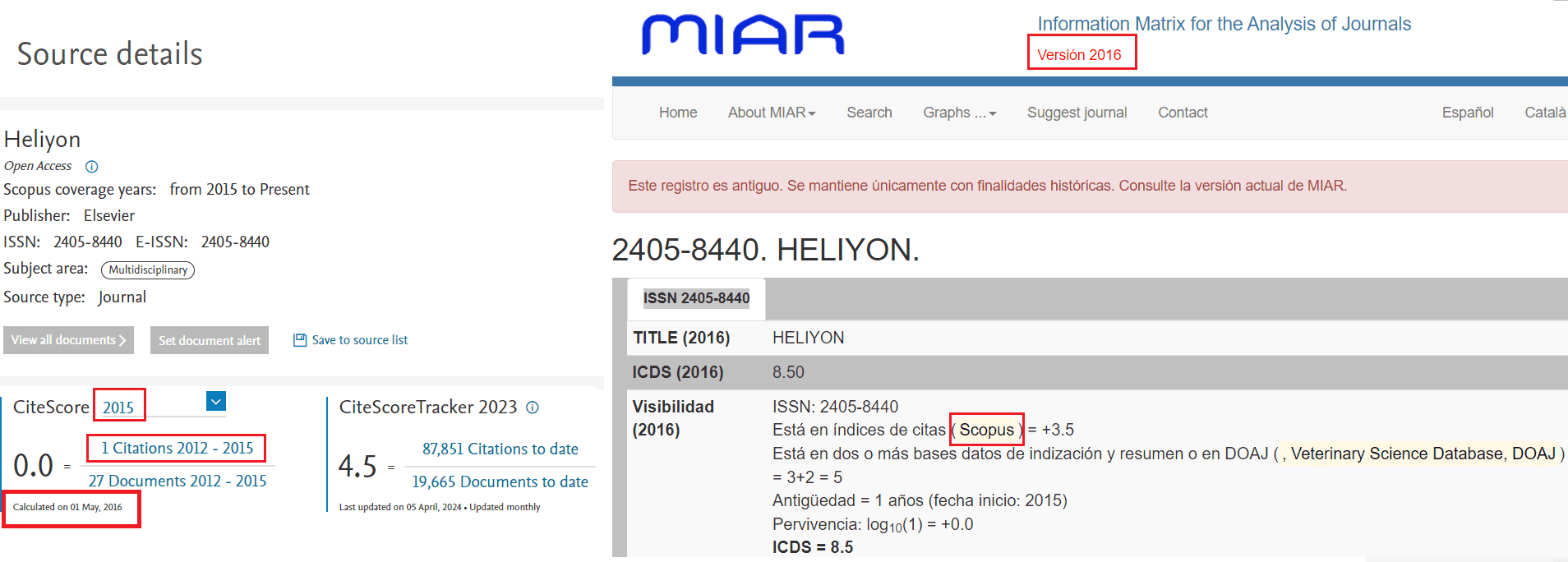
This article highlights unethical money-making tactics adopted by corporate publishing giant “Elsevier”. We know that Heliyon is a journal owned by Elsevier and is now operated by Cell Press which is a part of Elsevier. The journal calls itself an “all science” journal which has no definitive scope and would publish anything from any area of science. Elsevier also operates a so-called quality abstracting and citation database i.e., Scopus . The database lists over 42,000 journals publishing in various areas of science. Due to its corporate influence and lobbying, many countries and governments adopted this database as a credible source to identify high quality academic journals. The perception that Scopus presents a list of high-quality journals, however, is not true because Scopus not only indexes many poorly managed journals but also indexes the journals published by Elsevier.
Today, we will present the case of the Heliyon journal published by Elsevier which is a worst example of violation of “conflict of interest” law and ethical principle. This journal is indexed in PubMed, Scopus, Web of Science, Science Citation Index Expanded (SCIE), DOAJ etc. (Clarivate Impact factor 2022: 4). The journal started publishing in 2015 which can be verified by the “call for papers” issued by Elsevier on 31 March, 2015. The journal published 29 articles in 4 issues back in 2015, however, the stated frequency of publication was 12 issues per year. Strangely, we see that in a “call for papers” issued on LinkedIn (dated: 1 April, 2015) by Dr. Umashankar Subramaniam (Associate Editor - Heliyon) claimed that all the published articles in Heliyon will be covered by ScienceDirect and Scopus. Please remember, this was the time when the journal was shepherding articles for its inaugural issue, nothing was published till that time, but the Associate Editor of Heliyon assured potential authors that their published papers will be indexed in Scopus.

In addition, by visiting Scopus source details , we can see that, in year 2015, 29 articles published in Heliyon were indexed in Scopus and their CiteScore and CiteScore Rank was also calculated for 2015. Similarly, MIAR also shows that Helioyn was indexed in Scopus in 2015.

According to the U.S. Department of the Interior :
“Congress passed a criminal conflict of interest law, 18 U.S.C. § 208, which prohibits you from working on an assignment in some situations”.
“Specifically, this law says that you may not work on an assignment that you know will affect your own financial interests or the financial interests of your spouse or your minor child. The prohibition also applies if you know the assignment will affect the financial interests of: your general partner; an organization that you serve as an officer, director, employee, general partner, or trustee; or someone with whom you have an arrangement for employment, or with whom you are negotiating for employment.”
According to this law and ethical requirement, an individual or a company is prohibited to work on an assignment that will affect their own financial interest or the interests of their partner or other organization related to them. In the case of Heliyon and other Elsevier’s published journals, the company immediately indexes its journals in its own database i.e., Scopus to lure authors and to earn more money from authors and countries who/which don’t understand the reality behind such advance money-making operations conducted by capitalistic giants. Based on above findings, we ask the following questions:
Why did Scopus index Heliyon within a year of its inception?

Why did Scopus index Heliyon with just one (1) citation in 2015?
Does Scopus index all the journals within a year of their inception or this policy was specifically adapted for Heliyon and other journals published by Elsevier?
Does Scopus index all the journals that just published 4 issues in their year of inception or this policy is relaxed for Elsevier journals?
Does Indexing Elsevier journals in Scopus affect the financial interests of Elsevier or not?
Is it ethical and lawful for a publishing company (like Elsevier) to run an indexing and citation database and promote itself using its own/sponsored products like Scopus and Scimago?
Heliyon levies an Article Processing Charge (APC) of USD 2,100 to get an article published which is not a small amount. We think our readers would be able to understand the big unethical money-making game behind the operations such as Elsevier and Scopus. Elsevier operates Scopus and indexes its own journals without following any quality criteria imposed on non-Elsevier journals. The company assures its potential authors that their articles will be indexed in their own database to attract more and more money.
We wonder that no one on the globe is regulating or keeping an eye on such unethical and predatory operations. These companies are free to impose their self-crafted standards on the world to maximize their wealth and to influence countries and governments using their powerful capital force to adopt their products as a benchmark of quality. Elsevier with its approx. 2,065 published journals is an example of such unethical and predatory operations.
Don’t forget that Heliyon was indexed in Scopus immediately after few months of its inception with just one (1) citation and 4 issues. This facility was only available to Heliyon (and other journals published by Elsevier) because it is published by Elsevier which owns Scopus.
We wonder why no one including authors, editors, research watchdogs, and organizations like Committee On Publication Ethics (COPE) raised these questions?
Don't hesitate to comment if you think this article raised an important issue that must be addressed by related authorities, governments, and non-for-profit research stakeholders.
Read More: Q1 Results: Company's earnings jump by Rs 4,670 crore but stock falls by more than 7%
--Advertisement--

 Brijendra
Brijendra Share
Share



